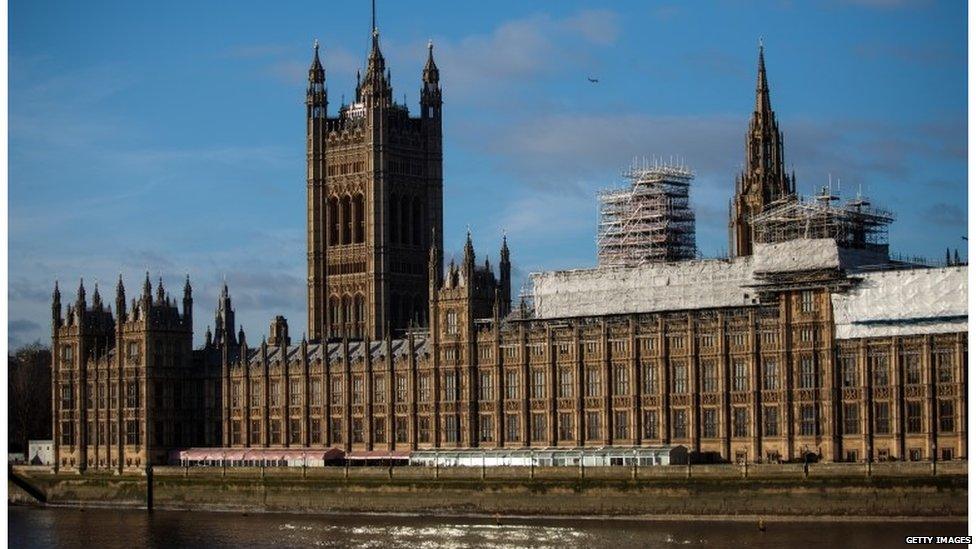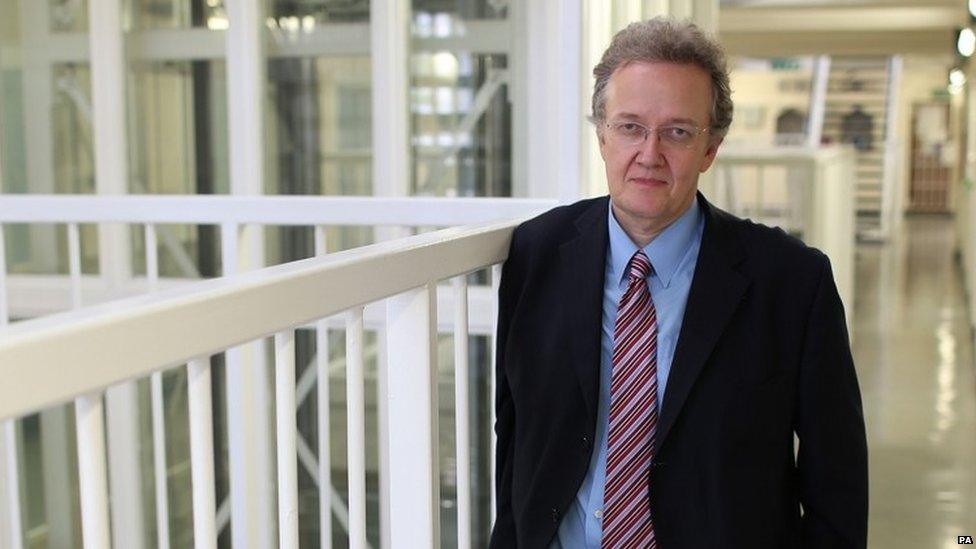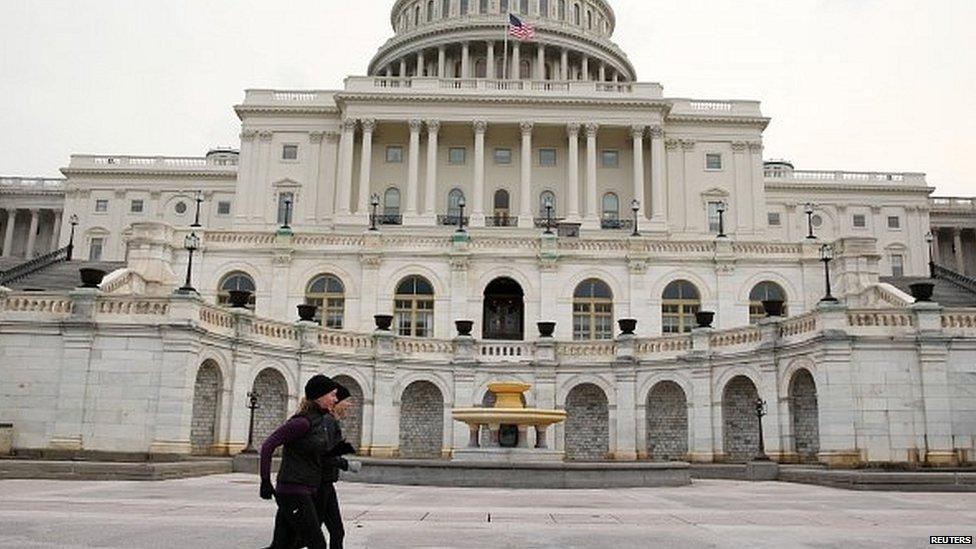Week ahead in Parliament
- Published

The Lords will vote on whether to leave the Palace of Westminster during a proposed £3.5bn refit
After a rather frenetic week at Westminster, the agenda, at least, suggests a quieter time in both Houses of Parliament next week - with no votes expected in the Commons.
But that may mean more plotting time for MPs, as the fizz of discontent and rumour around the prime minister continues.
Certainly this would be a bad week for Theresa May to be unhorsed at PMQs.
But apart from that, Mrs Lincoln, the main action will be in a series of important committee hearings, rather than on the floor of the Commons or the Lords.
There are two critical Transport Committee hearings on the Airports National Policy Statement - which Parliament has to approve before Heathrow can get an extra runway.
The Petitions Committee will launch an inquiry into the online abuse of disabled people, and the Home Affairs Committee will be looking at hate crime.
The Education and Health committees are joining forces to look at mental health services for young people and the Justice Committee has a hearing with the Parole Board, where the focus will doubtless be on the Warboys case.
And there will be hearings on the collapse of the public-sector mega-contractor Carillion. There's a joint effort by the Work and Pensions and Business committees with Carillion's top brass, and, intriguingly, the Liaison Committee, the super committee of all the select committee chairs, has an evidence session with David Lidington the Cabinet Office minister coordinating the government's response to Carillion.
The idea is to allow all the interested committees to talk (and that is most of them) to him in one go; this is both unprecedented - liaison normally talks only to the prime minister - and an early test of its Chair, Sarah Wollaston's enthusiasm for joined-up working.
Meanwhile, on the Brexit front, the first Lords amendments for the Committee Stage consideration of the EU (Withdrawal) Bill have started to drop.
The first of ten Committee Stage days is on Wednesday 21 February, when peers will begin debating amendments relating to the clauses on Repeal of the European Communities Act and the retention of existing EU law; there are a whole series of cross-party amendments which, while they probably won't be pressed to a vote at committee stage, could well tee-up serious attempts to rewrite the Bill at the later Report Stage, after Easter.
In addition the Lords Delegated Powers Committee has just published a report, external that, once again, criticises the powers it would grant to ministers and, highly unusually, includes actual amendments which it says should be made to the Bill. This committee carries considerable weight in the Lords, and this report suggests that leading members, like the former Clerk of the Commons Lord Lisvane, could push for changes to the Bill.
Here's my rundown of the week ahead:
Monday 5 February
The Commons opens - at 14.30 GMT - with Work and Pensions questions, after which any urgent questions or ministerial statements on matters arising over the weekend will normally be slotted in.
Then MPs debate the annual uprating of social security benefits. Although a vote is unlikely, Labour may raise the issue of frozen pensions - about 540,000 British pensioners living around the world receive no annual increase to their pension because pensions paid to British expats in more than 120 countries are frozen, meaning pensioners face a decline in their real terms income every year.
On the committee corridor the first of those two Transport Committee hearings on the NPS on Airports (see above) will be held, with top officials from Heathrow at 16.45 GMT.
In the Lords - at 14.30 GMT - the main debate, marking the centenary of the law which first gave women the vote in Britain, is on the role of women in public life and the progress made in increasing their representation in Parliament. In total, 38 peers are signed up to speak.
Tuesday 6 February

Katie Price is expected to talk about her own experience of online abuse
MPs begin with Health Questions - at 11.30 GMT - and then they will deal with the Space Industry Bill - which creates a legal framework for a space port in the UK. This has been beefed up in committee, with the addition of a requirement for an environmental assessment before a licence is granted to operate a space port, but as I write there don't appear to be any amendments for debate at Report stage.
That will be followed by a general debate on housing, planning and the green belt - a taking of the voices on an absolutely essential issue.
In Westminster Hall - at 9.30 GMT - the Labour MP Teresa Pearce leads a debate on personal, social, health and economic education - she says PSHE helps children in schools to become healthy, safe individuals prepared for adult life. But she is concerned that its current non-statutory status in the curriculum puts it at a disadvantage compared with other subjects.
At 16:30 GMT the Labour MP Sharon Hodgson leads a debate on entitlement to free school meals. She wants the rules changed so that all children below the poverty line are entitled to them, arguing that this "would strike a hefty blow against child poverty and rising levels of obesity".
On the Committee corridor there's another joint hearing on Carillion by the BEIS and Work and Pensions committees. They will be investigating how a company that was signed off by accountants, KPMG, as a solvent business in spring 2017 could crash into liquidation with a reported £5bn of liabilities and just £29m left in cash, less than a year later.
Model Katie Price will give evidence to the Commons Petitions Committee, as part of its investigation into online abuse, after a petition she signed achieved more than 220,000 signatures.
The petition outlines the abuse she and her family has suffered, especially her disabled son, and calls for online abuse to be a specific criminal offence and for a register of offenders to be created.
In the Lords - at 16.30 GMT - the day's main debate, on the Restoration and Renewal of the Palace of Westminster, follows on from the Commons debate which resulted in a vote to move out of the Victorian section of the Palace of Westminster for several years, to make way for essential repair work; will their lordships take the same line? And what will happen if they vote to stay?
Wednesday 7 February

Parole Board chair Nick Hardwick is likely to face tough questions on the Warboys case
The Commons opens - at 11.30 GMT - with Northern Ireland questions, followed, at noon by Prime Minister's Question Time - which could prove to be a very tough test for a beleaguered PM.
Then MPs will be asked to approve the annual grants to police forces and local government in England - expect considerable complaint about local law enforcement and the pressure on local services, including from Conservative MPs.
At least one, Daniel Kawczynski, has threatened to vote against because he does not regard the funding of his local council as adequate.
Also under way at that time will be a rare meeting of the Welsh Grand Committee - the first for two years - with sessions from 10.00 GMT and then from 14.00 GMT. They'll be pondering the implications of the Autumn Budget for Wales.
The other point of interest is that this will be the first time MPs will be permitted to address colleagues in Welsh, as opposed to uttering the odd phrase here and there. It's an innovation that was resisted by the former Leader of the Commons Chris Grayling, but brought in by his successor, David Lidington.
On the Committee corridor there's a rarity - a cross-cutting evidence session of the Liaison Committee - starting at 16.30 GMT - on the government response to the collapse of Carillion, guest starring Sir Amyas Morse, the Comptroller and Auditor General of the National Audit Office.
Also appearing are John Manzoni, chief executive of the Civil Service and Permanent Secretary at the Cabinet Office, and David Lidington, now the Minister for the Cabinet Office and Chancellor of the Duchy of Lancaster.
From 10.00 GMT, the Justice Committee will hold a one-off session to examine the implications of the John Worboys case, with the Chair of the Parole Board, Nick Hardwick, and Martin Jones, its CEO.
The Committee Chair, Bob Neill, said the focus would be on how the Parole Board makes its decisions and how victims are involved and kept informed. They will also talk to Baroness Newlove, the Victims' Commissioner for England and Wales and Sonia Crozier, the Executive Director of the National Probation Service in England.
In the Lords, from 15.00 GMT, the main debate is on the Second Reading of the Nuclear Safeguards Bill which is designed to ensure that when the United Kingdom leaves the European Atomic Energy Community, Euratom, there will be a legal framework to meet the UK's international obligations to demonstrate that civil nuclear material is not diverted into military or weapons programmes.
Thursday 8 February

MPs will be in Washington DC for their inquiry into fake news
The Commons convenes at 9.30 GMT for Digital, Culture, Media and Sport Questions, followed at 10.10 GMT by a mini-question time for the Government's top lawyer, the Attorney General, and then by the regular statement on forthcoming Commons debates by the Leader of the House, Andrea Leadsom.
There will be two brief statements by select committee chairs; first Mary Creagh of the Environmental Audit Committee, on their report on the Environmental Sustainability of the Ministry of Justice; then Work and Pensions Committee Chair Frank Field on their report on Universal Credit Project Assessment Reviews.
The day's main debates, chosen by the Backbench Business Committee, are on Community Bank Closures.
The motion proposed by Labour MP Ruth Smeeth and Conservative William Wragg, speaks of the "vital importance of community-based banking" and expresses concern about branch closure announcements by Lloyds Bank, RBS/Nat West, Santander, Yorkshire Building Society and the Co-operative Bank. It calls on the government to support measures to protect access to banking services in local communities in the UK.
After that comes a debate on "matters to be raised before the forthcoming adjournment" - a device to allow MPs to make a speech on any subject they choose. Now she no longer has a deputy, the Leader of the House, Andrea Leadsom, is expected to respond.
In Westminster Hall, the Conservative Fiona Bruce leads a debate on strengthening families. She wants to argue that strengthening family life for young children can head off mental health issues and other problems, and at the other end of the spectrum can prevent loneliness in old age.
There is also some rather unusual Committee action - in the shape of a Digital, Culture, Media and Sport hearing on Fake News. This is being held in Washington DC, in the hope of taking evidence from the bosses of big social media and internet companies - but many have responded by flying their UK leadership to the US for the occasion.
The session will be live streamed, from about 9.00 GMT Washington time, 14.00 GMT UK time.
In the Lords - from 11.00 GMT- peers debate two select committee reports; the Economic Affairs Committee on Brexit and the Labour Market and the European Union Committee report, Brexit: judicial oversight of the European Arrest Warrant.
And when that business is done, MPs and peers take a half-term break - returning on Tuesday 20 February.